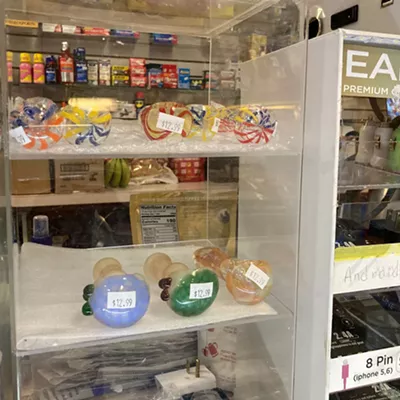In a yearslong fight to ensure that Washington state waterways and fish are safe for people to eat, environmental groups and the Makah Indian Tribe have sued the Environmental Protection Agency over its move to rollback water quality standards in a way that would allow more pollution.
Specifically, the lawsuit filed last week argues that the EPA's move to make the state's water quality standards less stringent, rather than more stringent, is not allowed under the Clean Water Act.
"There is no provision in the Clean Water Act that allows EPA to reconsider its disapproval of a state’s water quality standard in order to impose a less stringent standard on the state," the lawsuit states.
The suit was filed by the Puget Soundkeeper Alliance, Columbia Riverkeeper, Spokane Riverkeeper, RE Sources, the Pacific Coast Federation of Fishermen's Associations, the Institute for Fisheries Resources and the Makah Indian Tribe the day the less stringent regulations took effect.
"Unfortunately it’s sort of the latest in a long chapter of fighting that we’ve had to do on behalf of the water quality standards on polychlorinated biphenlys (PCBs), a toxin that shows up in all water discharges as well as in sediments and some groundwater inputs, too," says Spokane Riverkeeper Jerry White.
PCBs, which leach out of paints, oils and other products even though they haven't been produced since the 1970s, accumulate in the food chain, White says, making fish unsafe to eat in some places.
"In our Spokane River, this is really important for us because this water quality standard is the bar by which we measure a clean river," White says.
The water quality standards at issue in the lawsuit have a complicated history. Washington state had to update its standards in 2015, and proposed its own set of standards for a list of more than 100 pollutants. After environmental groups sued saying those weren't protective enough of people who consume large amounts of fish, the EPA set stricter standards for the state in 2016, and then state regulators got to work implementing them, and working on new restrictions for cities and companies that discharge toxins into waterways.
But under the Trump administration, the EPA came back last year and said that Washington's less strict standards would have been fine, and therefore the agency would roll-back its own stricter standards. The move was made after industry groups, including Greater Spokane Incorporated, Northwest Pulp and Paper Association and the Association of Washington Business asked EPA in 2017 to take another look at Washington's initial proposal, arguing it was scientifically sound.
By that point, however, Washington regulators were on board with the stricter rules, and the state Department of Ecology joined others in decrying the move to roll-back the standards.
“It is unconscionable that EPA would diminish water quality standards aimed at protecting human health in the middle of a public health crisis. EPA’s decision is bad for Washingtonians, and is especially hard on tribal nations and communities who rely on fishing for traditional diets and work," Ecology Director Laura Watson said in a statement about the rollback in April. “It is also illegal. EPA’s repeal of Washington’s existing standards violates the federal Clean Water Act. We have challenged this illegal action in court.”
Tribes are among those who've fought hardest for strict pollution controls to protect fish.
“The degradation of water quality standards is a direct assault on the Makah Tribe’s rights
reserved under the 1855 Treaty of Neah Bay and constitutes a direct attack on our sovereign interests and our way of life. Fish and other seafoods have always been fundamental to our
diet, economy and culture,” says Makah Tribal Council Chairman T.J. Greene, Sr. in a news release. “Our people require safe water and seafood to survive. We absolutely oppose the EPA’s actions and the agency’s failure to meaningfully consult with the Tribe in its decisions.”
SPOKANE RIVER AND VARIANCES
Under the stricter water quality standards, PCBs are limited to no more than 7 parts per quadrillion, which is nearly undetectable. However, under the rollback, dischargers can have up to 170 parts per quadrillion in their wastewater outfalls into the Spokane River.
The five largest dischargers into the Spokane River typically don't meet either standard yet.
Ecology was in the middle of considering variances that would acknowledge that the five dischargers don't and likely can't meet the standards yet, and put them on a path that could take up to 20 years to comply with the 7 parts per quadrillion limit.
The process marks the first time Ecology has considered a variance to a legal pollution limit, and involves a complicated environmental study, public input process, and technical evaluations.
The draft variance language was set to go up for public comment this month, but with the new lower standards taking effect June 12, Ecology has announced it will now pause the process until the court case from the state against EPA is resolved.
Similar to the environmental groups' lawsuit, the suit for Ecology filed by the state Attorney General's office argues that EPA cannot create lower standards for a state under the Clean Water Act.
However, while the variance process is on hold until that court case is resolved, Ecology has published its draft language and opened an informal public comment period, in hopes of collecting feedback from the public and continuing the conversation with dischargers in the meantime, says Ryan Lancaster, spokesman for Ecology's Eastern Regional Office.
"This is the first time we’ve ever had applications for a variance, so we’re trying to learn through the process," Lancaster says. "In the event we continue the formal rulemaking process, these informal comments won’t be included in the formal record, but they’re helping us make this better in the interim."
The documents can be found here, and comments should be submitted before July 25.

























